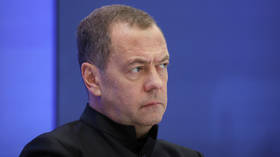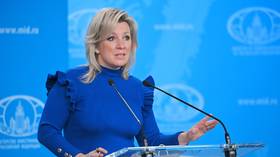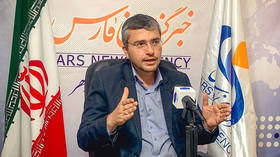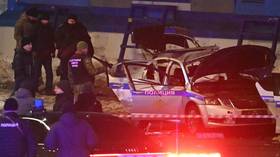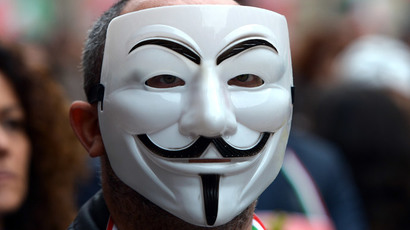FBI informant accused of organizing attack on Murdoch’s British newspaper

The FBI is in hot water once against upon release of a new report that raises questions about how federal authorities handled an investigation into the hacktivist group Anonymous.
According to the report published by Motherboard on Tuesday, the FBI watched idly as a hacker-turned-informant plotted within Anonymous to target the media empire of publisher Rupert Murdoch in 2011. The group succeeded in defacing the website of one of the papers owned by Murdoch’s News Corp., and the government’s cooperating witness then rallied other hackers to further go after members of the media by spreading false information on the web.
As RT reported previously, an ongoing investigation has revealed that the informant, Hector “Sabu” Monsegur, was instrumental in a number of operations undertaken by Anonymous and participated either directly or in-directly in campaigns that targeted American-owned corporations and foreign government servers alike.
LulzSec — an offshoot of the internationally dispersed hacktivist movement — made waves in June 2011 after cracking into the servers hosting the website for The Sun, a British tabloid, and posting a fake obituary depicting the death of Murdoch. According to the Motherboard article, federal authorities in the United States did nothing to notify the paper of the computer intrusion and, in fact, allowed Monsegur to try and expand the scope of the attack.

Monsegur played a pivotal role in a series of hacks conducted by LulzSec in 2010 and, following an arrest for computer crimes in June 2011, silently began cooperating with authorities. According to Monsegur’s attorneys, that cooperation helped identify and prosecute no fewer than eight accused cybercriminals, including Anonymous hacker Jeremy Hammond and former Reuters journalist Matthew Keys.
Motherboard’s report, however, suggests that Monsegur did just more than help track down hackers for the feds: using chatroom logs recorded by the FBI on Monsegur’s computer in July 2011 as source documents, the Motherboard report demonstrates that authorities must have been aware of the LulzSec operation waged against Murdoch, an American citizen, yet did nothing to stop it.
LulzSec hacktivists spent days inside of The Sun’s servers and Monsegur actively engaged in chat room dialogues with the Anons more intimately involved in the operation, providing technical assistance at times and otherwise advising the campaign.
Meanwhile, attorneys for US prosecutors and Monsegur have acknowledged that the FBI monitored his computer activity “around the clock,” and that special agents routinely debriefed with the informant after he conducted these conversations.
The Sun was never told that its networks were under attack and only learned when the defacement went live on July 18, 2011 — hours before its embattled publisher, Murdoch, was slated to testify before British parliament with regards to the phone-hacking scandal that only days earlier forced another one of his papers, News of the World, to shutter after 168 years of operation.
“It was not the FBI who tipped us off about the hack,” a spokesperson for The Sun told Motherboard.

Yet with all eyes that summer on Murdoch’s media conglomerate, News Corp., chat logs show that Monsegur rallied to further embarrass the publisher and other members of the press with a disinformation campaign, again all conducted as the FBI monitored the cooperating witness’ every move. According to documents, Monsegur spoke to several tech journalists after the Sun defacement went live and told them Anonymous had hacked a trove of NOTW emails; for days, Monsegur dangled this nonexistent correspondence in front of a handful of reporters and engaged directly with them in private messages, and also posted on the web the encrypted log-in credentials of News Corp. employees, also pilfered from the hacked server, in an effort to bring further damage to Murdoch’s media empire in the midst of a near implosion.
“Hi gentlemen,” Monsegur’s alias typed in a chat room at one point early on in the operation. “Gotta destroy the Murdoch empire.”
Although authorities never charged any hackers with breaking into The Sun, investigators later used records from the chat room where the operation was hatched to positively identify two Irish men involved with LulzSec. Monsegur was sentenced to time served earlier this year.


